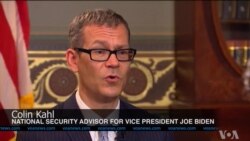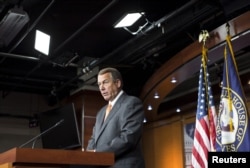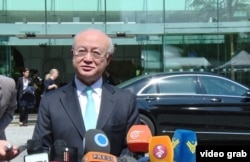U.S. Vice President Joe Biden's national security adviser said Tuesday that despite the best efforts of opponents to "demonize" the Iran nuclear deal, the U.S. is moving forward with the agreement.
"We are going to implement the deal," Colin Kahl told VOA's Persian service. "If Iran complies with its side of the bargain, we will comply with ours and I think the proof will be in the pudding."
Republicans in Congress have staunchly opposed the agreement reached in July between Iran and a group that includes the U.S., Britain, China, France, Russia and Germany. Lawmakers got 60 days to review the terms and either vote for or against the deal, but Republicans have so far failed in their bid to advance a resolution to reject it.
Republican opposition
Several Republicans running in next year's presidential election have also said they would seek to alter or scrap the deal.
"I think we have now a year and a half before the next president comes into office to demonstrate a track record of compliance on both sides that can build confidence the deal," Kahl said. "And the more confidence there is in the deal, the more politically sustainable it will be."
In exchange for limiting its nuclear program, Iran will receive sanctions relief under the agreement. But Kahl stressed that the sanctions due to be lifted are the ones that were imposed because of Iran's nuclear activity.
"But as it relates to all other sanctions that are on the books, both in terms of statutory and executive orders as it relates to human rights abuses and terrorism, those stay in the books," he said.
IAEA chief visit
Meanwhile, Iran is preparing for a visit later this week from Yukiya Amano, the head of the U.N.'s nuclear watchdog agency that will be tasked with overseeing the agreement.
Iranian nuclear chief Ali Akbar Salehi said late Monday after meeting with Amano in Vienna that the head of the International Atomic Energy Agency would be going to Tehran. The IAEA did not confirm the trip, saying only that it was talking with Iran about implementing the agreement and that a visit by Amano was under consideration.
Alongside the international agreement, Iran struck a separate deal in July with the IAEA on a roadmap toward resolving longstanding questions about possible military dimensions of its nuclear program.
Iran has long denied it sought to build nuclear weapons, insisting its program was for peaceful purposes such as medical research and power generation.
The IAEA is due to deliver a final report on its probe by December 15, and only after the U.N. is satisfied will the deal between Iran and the six world powers go forward, including the sanctions relief.














